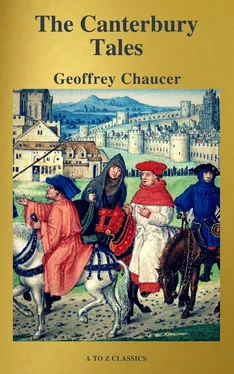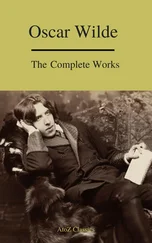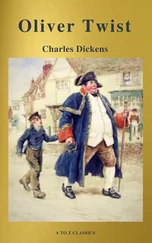For unto a povre ordre for to yive
Is signe that a man is wel yshryve;
For, if he yaf, he dorste make avaunt,
He wiste that a man was repentaunt.
For many a man so harde is of his herte,
He may nat wepe, al thogh hym soore smerte;
Therfore, in stede of wepynge and preyeres,
Men moote yeve silver to the povre freres.
His typet was ay farsed ful of knyves
And pynnes, for to yeven yonge wyves.
And certeinly he hadde a murye note,
Wel koude he synge, and pleyen on a rote,
Of yeddynges he baar outrely the pris.
His nekke whit was as the flour delys;
Therto he strong was as a champioun,
He knew the tavernes wel in every toun
And everich hostiler and tappestere
Bet than a lazar or a beggestere.
For unto swich a worthy man as he
Acorded nat, as by his facultee,
To have with sike lazars aqueyntaunce;
It is nat honeste, it may nat avaunce,
For to deelen with no swich poraille,
But al with riche and selleres of vitaille;
And overal, ther as profit sholde arise,
Curteis he was, and lowely of servyse.
Ther nas no man nowher so vertuous;
He was the beste beggere in his hous,
(And yaf a certeyn ferme for the graunt
Noon of his brethren cam ther in his haunt;)
For thogh a wydwe hadde noght a sho,
So plesaunt was his ‘In principio’
Yet wolde he have a ferthyng er he wente;
His purchas was wel bettre than his rente.
And rage he koude, as it were right a whelpe;
In love-dayes ther koude he muchel helpe;
For there he was nat lyk a cloysterer,
With a thredbare cope, as is a povre scoler,
But he was lyk a maister or a pope;
Of double worstede was his semycope,
That rounded as a belle out of the presse.
Somwhat he lipsed for his wantownesse
To make his Englissh sweete upon his tonge,
And in his harpyng, whan that he hadde songe,
Hise eyen twynkled in his heed aryght
As doon the sterres in the frosty nyght.
This worthy lymytour was cleped Huberd.
A Marchant was ther, with a forkek berd,
In mottelee, and hye on horse he sat,
Upon his heed a Flaundryssh bevere hat,
His bootes clasped faire and fetisly.
Hise resons he spak ful solempnely,
Sownynge alway thencrees of his wynnyng.
He wolde the see were kept for any thyng
Bitwixe Middelburgh and Orewelle.
Wel koude he in eschaunge sheeldes selle.
This worthy man ful wel his wit bisette;
Ther wiste no wight that he was in dette,
So estatly was he of his governaunce,
With his bargaynes and with his chevyssaunce.
Forsothe, he was a worthy man with-alle,
But, sooth to seyn, I noot how men hym calle.
A Clerk ther was of Oxenford also,
That unto logyk hadde longe ygo.
As leene was his hors as is a rake,
And he nas nat right fat, I undertake,
But looked holwe and therto sobrely.
Ful thredbare was his overeste courtepy,
For he hadde geten hym yet no benefice,
Ne was so worldly for to have office,
For hym was levere have at his beddes heed
Twenty bookes, clad in blak or reed,
Of Aristotle and his plilosophie,
Than robes riche, or fithele, or gay sautrie.
But al be that he was a philosophre,
Yet hadde he but litel gold in cofre;
But al that he myghte of his freendes hente,
On bookes and his lernynge he it spente,
And bisily gan for the soules preye
Of hem that yaf hym wherwith to scoleye.
Of studie took he moost cure and moost heede,
Noght o word spak he moore than was neede,
And that was seyd in forme and reverence,
And short and quyk, and ful of hy sentence.
Sownynge in moral vertu was his speche,
And gladly wolde he lerne, and gladly teche.
A Sergeant of the Lawe, war and wys,
That often hadde been at the parvys,
Ther was also, ful riche of excellence.
Discreet he was, and of greet reverence, —
He semed swich, hise wordes weren so wise.
Justice he was ful often in assise,
By patente, and by pleyn commissioun.
For his science, and for his heigh renoun,
Of fees and robes hadde he many oon.
So greet a purchasour was nowher noon,
Al was fee symple to hym in effect,
His purchasyng myghte nat been infect.
Nowher so bisy a man as he ther nas,
And yet he semed bisier than he was;
In termes hadde he caas and doomes alle,
That from the tyme of Kyng William were falle.
Therto he koude endite, and make a thyng,
Ther koude no wight pynche at his writyng.
And every statut koude he pleyn by rote.
He rood but hoomly in a medlee cote
Girt with a ceint of silk, with barres smale; —
Of his array telle I no lenger tale.
A Frankeleyn was in his compaignye;
Whit was his berd as is a dayesye.
Of his complexioun he was sangwyn.
Wel loved he by the morwe a sope in wyn,
To lyven in delit was evere his wone;
For he was Epicurus owene sone,
That heeld opinioun that pleyn delit
Was verraily felicitee parfit,
An housholdere, and that a greet, was he;
Seint Julian was he in his contree.
His breed, his ale, was alweys after oon,
A bettre envyned man was nowher noon.
Withoute bake mete was nevere his hous,
Of fissh and flessh, and that so plentevous,
It snewed in his hous of mete and drynke,
Of alle deyntees that men koude thynke.
After the sondry sesons of the yeer
So chaunged he his mete and his soper.
Ful many a fat partrich hadde he in muwe,
And many a breem and many a luce in stuwe.
Wo was his cook, but if his sauce were
Poynaunt, and sharp, and redy al his geere.
His table dormant in his halle alway
Stood redy covered al the longe day.
At sessiouns ther was he lord and sire;
Ful ofte tyme he was knyght of the shire.
An anlaas and a gipser al of silk
Heeng at his girdel, whit as morne milk.
A shirreve hadde he been, and a countour,
Was nowher swich a worthy vavasour.
An Haberdasshere and a Carpenter,
A Webbe, a Dyere, and a Tapycer —
And they were clothed alle in o lyveree
Of a solempne and a greet fraternitee.
Ful fressh and newe hir geere apiked was,
Hir knyves were chaped noght with bras,
But al with silver wroght ful clene and weel,
Hir girdles and hir pouches everydeel.
Wel semed ech of hem a fair burgeys
To sitten in a yeldehalle on a deys.
Everich for the wisdom that he kan
Was shaply for to been an alderman;
For catel hadde they ynogh, and rente,
And eek hir wyves wolde it wel assente —
And eles, certeyn, were they to blame!
It is ful fair to been ycleped ‘ma Dame,’
And goon to vigilies al bifore,
And have a mantel roialliche ybore.
A Cook they hadde with hem for the nones,
To boille the chiknes with the marybones,
And poudre-marchant tart, and galyngale.
Wel koude he knowe a draughte of London ale;
He koude rooste, and sethe, and broille, and frye,
Maken mortreux, and wel bake a pye.
But greet harm was it, as it thoughte me,
That on his shyne a mormal hadde he!
For blankmanger, that made he with the beste.
A Shipman was ther, wonynge fer by weste;
For aught I woot, he was of Dertemouthe.
He rood upon a rouncy, as he kouthe,
In a gowne of faldyng to the knee.
A daggere hangynge on a laas hadde he
Aboute his nekke, under his arm adoun.
The hoote somer hadde maad his hewe al broun,
And certeinly he was a good felawe.
Ful many a draughte of wyn had he ydrawe
Fro Burdeuxward, whil that the chapman sleep.
Of nyce conscience took he no keep;
Читать дальше












